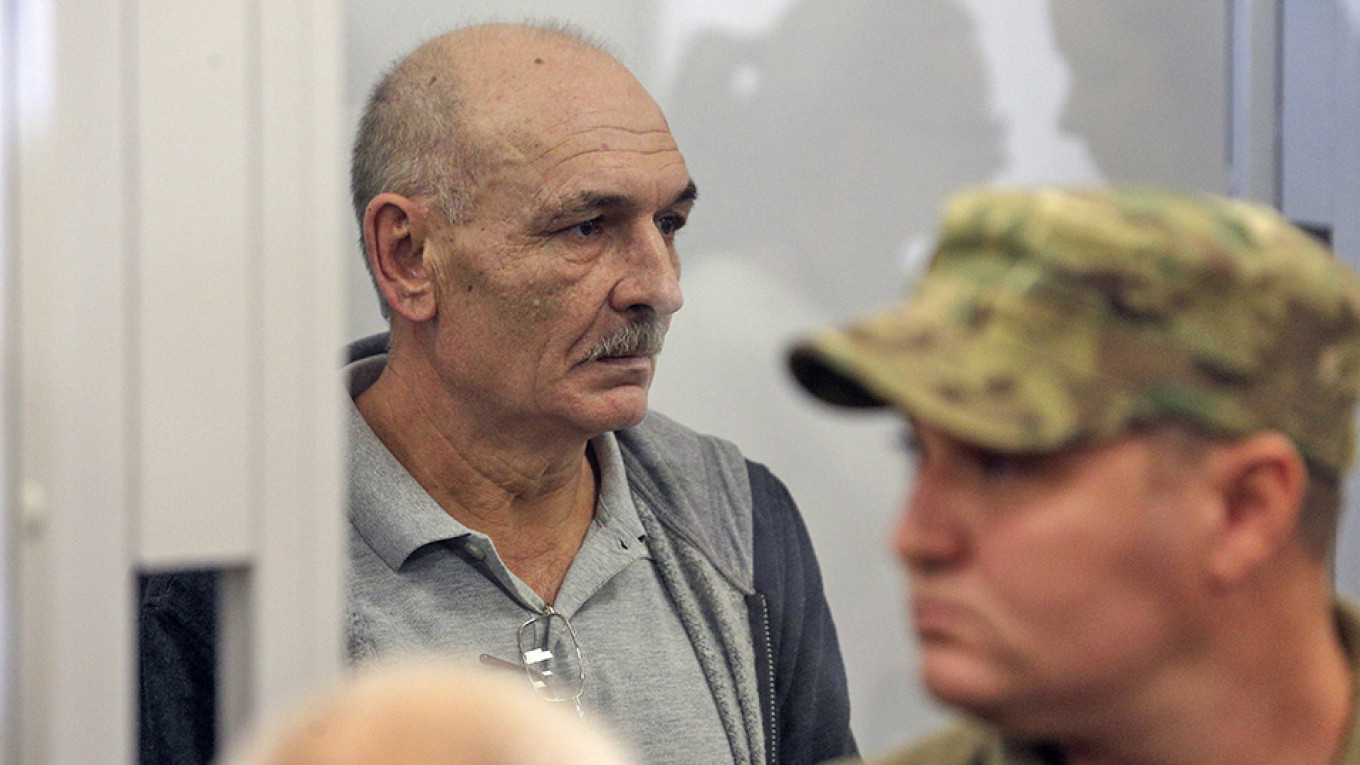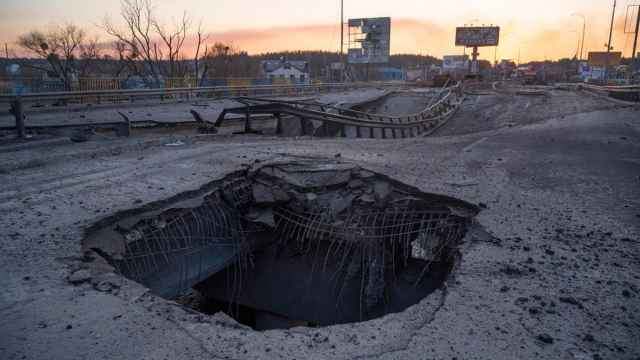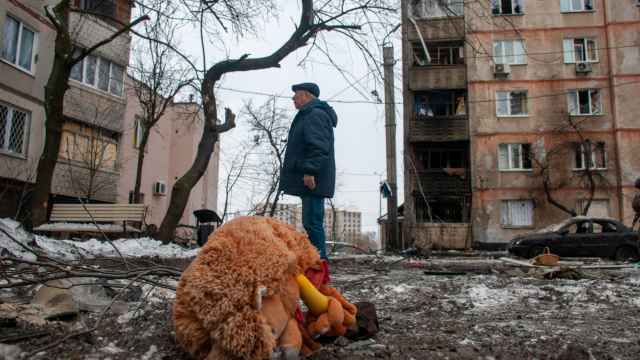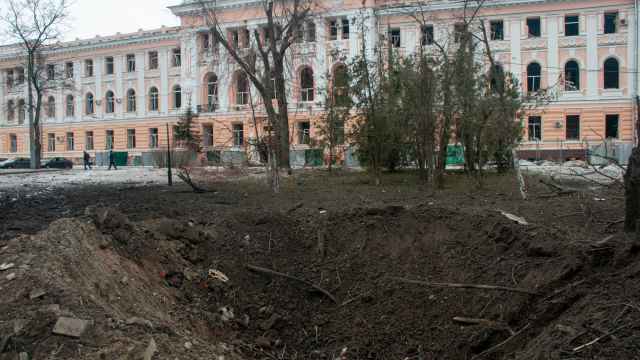Last Thursday morning I was standing just inches away from the caged Vladimir Tsemakh in courtroom 0307 of the Kiev Appellate Court, as Ukrainian reporters shouted random, pointless questions at him through the metal bars. He didn’t answer any of them, he looked impatient for the charade to be over.
Sure enough, minutes later three judges returned from an indecently brief — and clearly unnecessary — consideration break, and read their pre-planned verdict to release the sole captured suspect in the MH17 case “on his own recognizance.”
As the reporters, following a collective gasp, began shouting the news down their phones, I watched Tsemakh's face. He was not surprised, he had expected the outcome.
He didn’t look overwhelmed with joy either. He knew he would not really be freed, but rather ushered away and kept in custody until the prisoner swap on Saturday. He also knew that after the swap, he would not be free either.
He would simply be traded by one country that prized him as a witness, to another country that prizes him as a non-witness.
When Tsemakh was captured in June, drunk in his home in Donbass, and renditioned to Kiev in a daring joint operation by Ukrainian security service and military intelligence commandos, few expected that Ukraine would even consider letting him go in a prisoner swap.
Ukraine had charged him with at least four murders during his stint as an anti-aircraft unit commander for the separatist Donetsk People’s Republic (DNR).
One Ukrainian commando died in the rendition mission when he stepped on a landmine, and another was left disabled for life.
But the thing that gave Tsemakh global notoriety — and made him an unthinkable candidate for release — was his own admission on camera in a boastful 2015 interview that he had helped hide the BUK anti-aircraft system that shot down MH17. In his version of events, it shot at a Ukrainian military plane, which was allegedly flying at the same time and the same place. Russia has denied that such a plane existed.
Yet, by late August it became known that the Ukrainian government had agreed, in principle, to include Tsemakh in the long-anticipated swap of prisoners.
Russia had offered to accelerate the timing of the exchange, and even included filmmaker Oleg Sentsov on the list, but only on the last-minute condition that Ukraine would hand over Tsemakh.
What’s more, Russia appeared to suggest that the whole deal would be off the table if Tsemakh was not part of the exchange.
Despite objections by Ukrainian intelligence services and pleas by the member governments of the Joint Investigation Team (JIT) pursuing the MH17 criminal inquiry, Ukraine’s president Volodymyr Zelenskiy chose to buy what looked like Russia’s bluff. Even the last-minute reported change of Tsemakh’s status from witness to suspect in the MH17 investigation was not enough to tip the balance.
As my colleagues and I wrote in July, Tsemakh’s arrest had offered an unexpected boon for the MH17 investigation.
Not so much in terms of additional evidence, of which, by all accounts, there is more than enough, and only a fraction of it will have been made public before the Dutch courts start deliberating next March.
Tsemkah’s appearance before the court — whether as a voluntary witness under a potential non-prosecution deal with Ukraine’s prosecutors — or as an indicted accessory, would have given an extra layer of legitimacy to the court proceedings.
Based on many conversations I have had with sources close to the Kremlin over the past two years, it is clear that Russia’s main strategy for dealing with the impending MH17 judicial doom is to de-legitimize the verdict of the Dutch court.
To achieve this, I have repeatedly been told, the Kremlin is depending on two must-have conditions.
First, it must ensure the dissenting opinion of Malaysia, a rightful member of the MH17 JIT and operator of the downed airliner. Second, it must ensure that none of the indicted suspects — whether Russian or Ukrainian — appear in court. The absence of a charged person in court would mean that no legal representation would have to be provided by Russia.
And no defense presence in court will mean that it will only hear the prosecution’s side of the story. No matter how convincing and fact-supported that story is, Russia will always be able to claim that the process was one-sided, and thus — it will argue — illegitimate.
Knowing this, Russia’s willingness to wager the fate of sixty-something prisoners on ensuring they got Tsemakh out of the JIT’s hands begins to look less like a bluff and more like a desperate measure indispensable to Moscow’s strategy.
Russia did not foresee that Tsemakh — or anyone from the long list of people of interest involved in the logistics of repatriating the BUK Telar in July 2014 — would end up in Ukraine’s hands. Zelenskiy could have used this desperation to extract more concessions from Moscow.
However, in trying to remedy this blunder — and get Tsemakh out of Dutch hands at any cost — the Kremlin may have committed another one.
As of noon on Sept. 7, Vladimir Tsemakh, a formal suspect in the MH17 criminal investigation, is on Russian territory, as shown on television and put on the record by Russian officials.
Tsemakh is not a Russian citizen, or at least he was not one when the Netherlands filed an extradition request for him in accordance with the Russia-ratified Treaty for Mutual Assistance in Criminal Matters.
This request was reportedly lodged on Saturday, within minutes of Tsemakh landing in Moscow. And according to the treaty, Russia will have no grounds to refuse to extradite a bona fide third-country suspect, as the Russian constitutional impediments to hand over its own citizens do not apply.
No one believes Russia will honor its obligations under the treaty. However, finding a pretext for reneging on its multiple international obligations, among them its signature on a 2014 UN Security Council resolution, will be exceedingly difficult in this case.
It may be even harder for Russia to explain why it made the fate of its nationals held in Ukrainian prisons conditional on the release of one person, who is not even a Russian national.
By placing all of its bets on solving this emergency, the Kremlin may have given the JIT exactly what it needed from it — legitimization of the Dutch court proceedings.
A Message from The Moscow Times:
Dear readers,
We are facing unprecedented challenges. Russia's Prosecutor General's Office has designated The Moscow Times as an "undesirable" organization, criminalizing our work and putting our staff at risk of prosecution. This follows our earlier unjust labeling as a "foreign agent."
These actions are direct attempts to silence independent journalism in Russia. The authorities claim our work "discredits the decisions of the Russian leadership." We see things differently: we strive to provide accurate, unbiased reporting on Russia.
We, the journalists of The Moscow Times, refuse to be silenced. But to continue our work, we need your help.
Your support, no matter how small, makes a world of difference. If you can, please support us monthly starting from just $2. It's quick to set up, and every contribution makes a significant impact.
By supporting The Moscow Times, you're defending open, independent journalism in the face of repression. Thank you for standing with us.
Remind me later.








